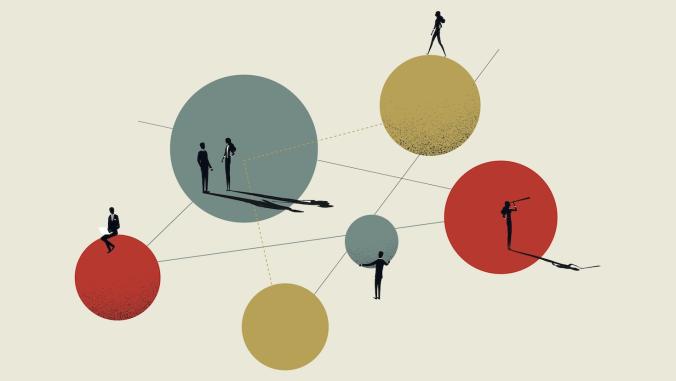How social entrepreneur Safia Minney is designing responsible sourcing into the fashion industry
The founder of People Tree chats about how sustainable materials and a growing awareness of human rights are redesigning the apparel industry.

Safia Minney, founder of People Tree
Safia Minney, consultant and founder of People Tree, has pioneered sustainable and ethical sourcing in the fashion industry. She has won many international awards, been acknowledged by the World Economic Forum as an outstanding social entrepreneur and received recognition from Britain's Queen Elizabeth II for services to the fashion industry and fair trade. Minney is author of nine books about sustainable fashion and is featured in "The True Cost," a movie that showcases her company’s best-practice sustainable work.
Minney is a British citizen of Indian-Mauritian and Swiss origin who moved to Japan at age 25. She found Tokyo a high-tech city with low environmental awareness. Her first task was to compile a directory of organic and vegetarian food shops and recycling facilities. This spawned Global Village, an NGO she founded in 1991, which later became the for-profit People Tree, where she has run the design, sourcing and buying of sustainable materials as well as the supply-chain innovation processes. Minney developed standards in organic cotton as certified by the Soil Association, and hers is the first fashion company to be awarded the World Fair Trade Organization product label.
Shannon Houde: Which Sustainable Development Goals matter most to you, and why? Which companies do you see making big strides towards these?
Safia Minney: There are four SDGs that resonate with me the most. The first that comes to mind is ending poverty. This is the SDG through which all the other SDGs are reflected, whether health, gender or environmental justice. Our very existence is dependent on a healthy ecosystem: We need to start thinking about the SDGs holistically.
You probably could guess this next one based on my career story, ethical production and consumption: people who want to use their power when shopping or investing to reflect their values, be it human rights or environmental.
Another SDG that is thankfully getting a lot of attention right now is climate action. It is powerful what is happening with the Friday school strikes and Extinction Rebellion; governments need to take the climate emergency seriously. This whole debate was galvanized by young people. Greta Thunberg [the Swedish climate campaigner] has really pushed back on government. Climate action should have started in earnest 30 years ago; we have little time to waste now. Government and media need to start telling the truth about it. Business and civil society have the solutions; we just lack the political will.
Lastly, I’ll say small ethical pioneer companies are growing fast and still doing incredible work setting high standards and a new agenda for sustainability. For large corporations, ASOS has shown leadership in mapping their supply chains and sharing know-how with medium-sized fashion brands. That they have published their Modern Slavery Reports proves the depth of engagement. However, there is still the elephant in the room, that disposable fashion is completely unsustainable in terms of natural resource use, plastics and chemical pollution, while 8 percent of total carbon emissions reportedly come from the fashion industry.Disposable fashion is completely unsustainable in terms of natural resource use, plastics and chemical pollution, while 8 percent of total carbon emissions reportedly come from the fashion industry.
Houde: How do you see the responsible sourcing agenda moving forward? Who do you see as the leaders in this space? Why?
Minney: Lots of smaller initiatives. The pioneers are the brands that are really investing in innovation. Common Objective, which grew out of the Ethical Fashion Forum, is a very useful platform for large companies and startups.
There’s also expertise sharing. Kering has done some interesting work with their sustainable fabric lab supporting their many brands with access to sustainable materials and initiatives with the London College of Fashion. I hope that they soon engage more seriously with the social issues in their supply chains. Hand-embellishment being a huge feature of luxury fashion requires a strong approach to fair wages and anti-slavery. Stella McCartney has done good work building market awareness of sustainable fashion.
Really, it’s all investor-led. Big banks and investment funds are fueling fashion retail, and [environmental, social and governance is] now a key part of their due diligence. For my book, "Slave to Fashion," I researched the banks behind the British High Street and found their analysts had very little understanding three years ago. That has changed dramatically, and fashion companies are highly sensitive to reputational risks, from waste to slavery in supply chains. Now that analysts are requiring the legal departments to answer these concerns, human rights and sustainability are moving front of mind in the C-suite.
Enforcement is imperative in moving the responsible sourcing agenda forward. Governments worldwide are writing new legislation, looking at obstacles to enforcement, to create a level playing field for the companies doing the right thing. If you run a Fair Trade company like People Tree, it is hard to compete with big fashion houses built on slavery and pollution. We need to stop this race to the bottom.Big banks and investment funds are fueling fashion retail, and ESG is now a key part of their due diligence.
Houde: What should the apparel sector be doing more of to achieve responsible sourcing?
Minney: They should be buying differently. Companies need to build a new critical path that means sustainable materials: organic cotton means less water, supports soil fertility, indigenous seeds, it works for the environment and sustains a livelihood. We need to rapidly reduce carbon emissions, sea freight not air freight, and rethink fossil-based materials and energy. Companies must transition quickly, taking their teams on that journey with passionate CEO engagement. Factories and workers can’t be expected to shoulder that risk, so partnership is key.
The sector as a whole also needs to be educating the consumer and other stakeholders to rethink the way they live. This is a personal passion of mine coming from the communications industry and always wanting to see advertising and creativity used for social good.
Houde: How do you define social entrepreneurship? And what is your impact goal?
Minney: Social entrepreneurship is looking at the people, environmental sustainability and profit at the same time. At People Tree, we are using the tools of business with the goal of delivering social impact and reducing environmental impact, and we want to prove that the model works to set an example to the fashion industry.
We bring technical expertise, understanding hand-crafted and sustainable fabrics, how they drape, and should be stitched differently than mass-produced ones. Through this, we deliver Fair Trade to over 5,000 farmers and artisans and tailors. We bring community development projects to support women workers. For example, we participated in starting the first crèche in northwest Bangladesh.
Houde: What is the advice you would give to up-and-coming social entrepreneurs?
Minney: I have three main bits of advice. The first being: Fashion is over-populated! There are ethical fashion brands in every category, and I would love to see more social entrepreneur startups in other areas.
Additionally, founders need support. It is isolating and tough at the top. Business mentoring and executive coaching is key.
Lastly, gain experience. Switch to and work in the field you want to start your enterprise in. Social enterprise is no different from traditional business. While sustainability won’t go away, it is a challenging time in terms of financing, networking, etc. A business mentor can help you get your business off the ground.





